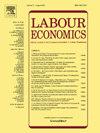Job loss, consumption insurance, and household time allocation
IF 2.2
2区 经济学
Q2 ECONOMICS
引用次数: 0
Abstract
This study examines how married households respond to negative income shocks resulting from the husband’s job loss, focusing on both monetary insurance channels and changes in the time use of husbands and wives. Using a unique Japanese panel dataset, the empirical analysis shows that the husband’s involuntary job loss leads to significant and persistent declines in his labor earnings. However, the impact on household consumption expenditure is considerably smaller, with only about one-fifth of the income shock transmitted to consumption, suggesting that a substantial amount of monetary insurance is at work. In the short run, unemployment benefits play a crucial role in mitigating the shock, while the wife’s labor supply becomes important in the long run, especially for households where the wife was not employed full-time before the job loss. Additionally, husbands significantly increase their time spent on home production following job loss, and this effect persists for at least three years.
失业、消费保险和家庭时间分配
本研究探讨了已婚家庭如何应对丈夫失业带来的负收入冲击,重点关注货币保险渠道以及丈夫和妻子的时间使用变化。利用日本独特的面板数据集进行的实证分析表明,丈夫非自愿失业会导致其劳动收入显著且持续下降。然而,对家庭消费支出的影响要小得多,只有约五分之一的收入冲击会传导到消费上,这表明有大量的货币保险在起作用。在短期内,失业救济在缓解冲击方面发挥了重要作用,而妻子的劳动力供给在长期内变得非常重要,尤其是对于妻子在失业前没有全职工作的家庭。此外,失业后丈夫花在家庭生产上的时间会显著增加,而且这种影响至少会持续三年。
本文章由计算机程序翻译,如有差异,请以英文原文为准。
求助全文
约1分钟内获得全文
求助全文
来源期刊

Labour Economics
ECONOMICS-
CiteScore
3.60
自引率
8.30%
发文量
142
期刊介绍:
Labour Economics is devoted to publishing research in the field of labour economics both on the microeconomic and on the macroeconomic level, in a balanced mix of theory, empirical testing and policy applications. It gives due recognition to analysis and explanation of institutional arrangements of national labour markets and the impact of these institutions on labour market outcomes.
 求助内容:
求助内容: 应助结果提醒方式:
应助结果提醒方式:


